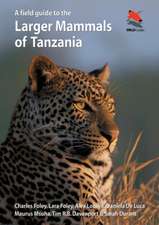The Human Genome Project and Minority Communities: Ethical, Social, and Political Dilemmas
Autor Peter J. Balint, Raymond A. Zilinskasen Limba Engleză Hardback – 29 noi 2000 – vârsta până la 17 ani
Preț: 342.71 lei
Preț vechi: 474.57 lei
-28% Nou
Puncte Express: 514
Preț estimativ în valută:
65.57€ • 68.47$ • 54.15£
65.57€ • 68.47$ • 54.15£
Carte tipărită la comandă
Livrare economică 15-29 aprilie
Preluare comenzi: 021 569.72.76
Specificații
ISBN-13: 9780275969615
ISBN-10: 0275969614
Pagini: 160
Dimensiuni: 140 x 210 x 16 mm
Greutate: 0.29 kg
Editura: Bloomsbury Publishing
Colecția Praeger
Locul publicării:New York, United States
ISBN-10: 0275969614
Pagini: 160
Dimensiuni: 140 x 210 x 16 mm
Greutate: 0.29 kg
Editura: Bloomsbury Publishing
Colecția Praeger
Locul publicării:New York, United States
Notă biografică
RAYMOND A. ZILINSKAS is a Senior Scientist at the Center for Nonproliferation Studies, Monterey Institute of International Studies in Monterey, CA. Dr. Zilinskas has worked for the Office of Technology Assessment, the UN Industrial Development Organization, and the Center for Public Issues in Biotechnology, University of Maryland Biotechnology Institute. He is an adjunct Associate Professor at the School of Hygiene and Public Health, The Johns Hopkins University. Among his earlier books is Biological Warfare: Modern Offense and Defense.PETER J. BALINT is an Adjunct Lecturer in Quantitative Methods at the University of Maryland. He has published on such subjects as biotechnology policy, US trade policy, and drinking water and sanitation in the developing world. Along with Dr. Zilinskas, he coedited Genetically Engineered Marine Organisms: Environmental and Economic Risks and Benefits.
Cuprins
PrefaceThe Age of Biology and the Responsible Ancestor by Martha A. Krebs and Daniel DrellThe Human Genome Project: Hereditary Diseases and Implications for Gene Therapy by Karen E. NelsonThe Genetics of Human Behavior: Lessons from the Human Genome Project by Jonathan BeckwithThe Human Genome Project and the African American Community: Race, Diversity, and American Science by Fatimah JacksonScientific and Folk Ideas about Heredity by Jonathan M. MarksSocial and Medical Implications of New Genetic Techniques by Robert F. Murray, Jr.Genetic Education to African American and Russian Immigrant Communities in Northwest Baltimore by Ilana Suez MittmanThe Human Genome Project and Buddhism by Akey C. F. HungThoughts on the Human Genome Project and Maryland by Kathleen Kennedy TownsendThe Human Genome Project: Reaching Minority Communities in Maryland, A Report of Results of the Conference Evaluation Study prepared by the Survey Research CenterThe Human Genome Project and Minority Communities: The Importance of Dialogue and Access to Information by Raymond A. Zilinskas and Peter J. Balint







